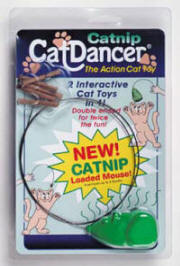|
 Getting Started -
Play behaviors Getting Started -
Play behaviors
Early play teaches kittens
how to hunt, fight, play and escape danger. By five months of age,
kittens begin to play rough.
 It's important to redirect this play
away from human finges and toes to cat
toys. Allowing your kitten to play bite or scratch your hands or
legs may lead to aggressive adult cat play. It's important to redirect this play
away from human finges and toes to cat
toys. Allowing your kitten to play bite or scratch your hands or
legs may lead to aggressive adult cat play.
Instead, select toys for
as play outlets for normal cat behaviors. Keep play real. Move feather toys like birds,
laser lights like bugs, strings like mouse tails!
Continue play with
your adult cat to allow natural behaviors, healthy exercise and
quality time with you. Keep play interesting by varying the game and
toy every few minutes and allowing your cat to win by pouncing on
the object. Toss in an occasional treat to make the win more like a
successful hunt.
Kitten Development
Adolescence: 17 weeks to 1 year
-
Sexual maturity if not
altered; spraying and fighting to protect territory
-
If allowed outdoors, may
wander farther away from home.
-
Keep a break-away collar
with an
identification tag on at all times.
-
Consider a
microchip - permanent identification - to avoid losing your
kitten
AAFP.
(2004). Feline Behavior
Guidelines. Pg. 10. |